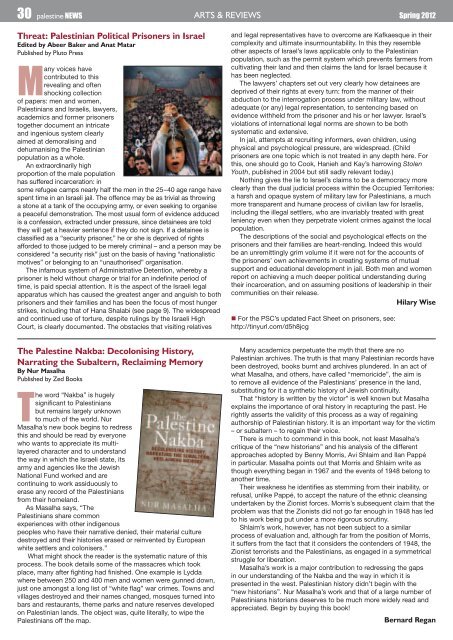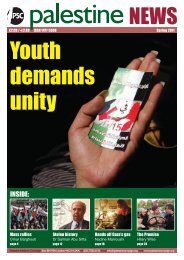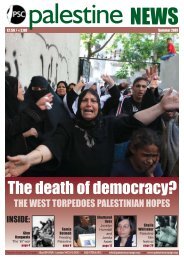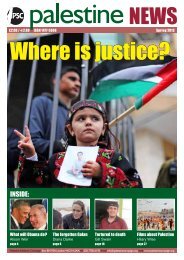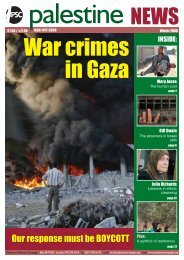World demands - Palestine Solidarity Campaign
World demands - Palestine Solidarity Campaign
World demands - Palestine Solidarity Campaign
You also want an ePaper? Increase the reach of your titles
YUMPU automatically turns print PDFs into web optimized ePapers that Google loves.
30 palestine NEWS ARTS & REVIEWSSpring 2012Threat: Palestinian Political Prisoners in IsraelEdited by Abeer Baker and Anat MatarPublished by Pluto PressMany voices havecontributed to thisrevealing and oftenshocking collectionof papers: men and women,Palestinians and Israelis, lawyers,academics and former prisonerstogether document an intricateand ingenious system clearlyaimed at demoralising anddehumanising the Palestinianpopulation as a whole.An extraordinarily highproportion of the male populationhas suffered incarceration: insome refugee camps nearly half the men in the 25–40 age range havespent time in an Israeli jail. The offence may be as trivial as throwinga stone at a tank of the occupying army, or even seeking to organisea peaceful demonstration. The most usual form of evidence adducedis a confession, extracted under pressure, since detainees are toldthey will get a heavier sentence if they do not sign. If a detainee isclassified as a “security prisoner,” he or she is deprived of rightsafforded to those judged to be merely criminal – and a person may beconsidered “a security risk” just on the basis of having “nationalisticmotives” or belonging to an “unauthorised” organisation.The infamous system of Administrative Detention, whereby aprisoner is held without charge or trial for an indefinite period oftime, is paid special attention. It is the aspect of the Israeli legalapparatus which has caused the greatest anger and anguish to bothprisoners and their families and has been the focus of most hungerstrikes, including that of Hana Shalabi (see page 9). The widespreadand continued use of torture, despite rulings by the Israeli HighCourt, is clearly documented. The obstacles that visiting relativesand legal representatives have to overcome are Kafkaesque in theircomplexity and ultimate insurmountability. In this they resembleother aspects of Israel’s laws applicable only to the Palestinianpopulation, such as the permit system which prevents farmers fromcultivating their land and then claims the land for Israel because ithas been neglected.The lawyers’ chapters set out very clearly how detainees aredeprived of their rights at every turn: from the manner of theirabduction to the interrogation process under military law, withoutadequate (or any) legal representation, to sentencing based onevidence withheld from the prisoner and his or her lawyer. Israel’sviolations of international legal norms are shown to be bothsystematic and extensive.In jail, attempts at recruiting informers, even children, usingphysical and psychological pressure, are widespread. (Childprisoners are one topic which is not treated in any depth here. Forthis, one should go to Cook, Hanieh and Kay’s harrowing StolenYouth, published in 2004 but still sadly relevant today.)Nothing gives the lie to Israel’s claims to be a democracy moreclearly than the dual judicial process within the Occupied Territories:a harsh and opaque system of military law for Palestinians, a muchmore transparent and humane process of civilian law for Israelis,including the illegal settlers, who are invariably treated with greatleniency even when they perpetrate violent crimes against the localpopulation.The descriptions of the social and psychological effects on theprisoners and their families are heart-rending. Indeed this wouldbe an unremittingly grim volume if it were not for the accounts ofthe prisoners’ own achievements in creating systems of mutualsupport and educational development in jail. Both men and womenreport on achieving a much deeper political understanding duringtheir incarceration, and on assuming positions of leadership in theircommunities on their release.Hilary Wise• For the PSC’s updated Fact Sheet on prisoners, see:http://tinyurl.com/d5h8jcgThe <strong>Palestine</strong> Nakba: Decolonising History,Narrating the Subaltern, Reclaiming MemoryBy Nur MasalhaPublished by Zed BooksThe word “Nakba” is hugelysignificant to Palestiniansbut remains largely unknownto much of the world. NurMasalha’s new book begins to redressthis and should be read by everyonewho wants to appreciate its multilayeredcharacter and to understandthe way in which the Israeli state, itsarmy and agencies like the JewishNational Fund worked and arecontinuing to work assiduously toerase any record of the Palestiniansfrom their homeland.As Masalha says, “ThePalestinians share commonexperiences with other indigenouspeoples who have their narrative denied, their material culturedestroyed and their histories erased or reinvented by Europeanwhite settlers and colonisers.”What might shock the reader is the systematic nature of thisprocess. The book details some of the massacres which tookplace, many after fighting had finished. One example is Lyddawhere between 250 and 400 men and women were gunned down,just one amongst a long list of “white flag” war crimes. Towns andvillages destroyed and their names changed, mosques turned intobars and restaurants, theme parks and nature reserves developedon Palestinian lands. The object was, quite literally, to wipe thePalestinians off the map.Many academics perpetuate the myth that there are noPalestinian archives. The truth is that many Palestinian records havebeen destroyed, books burnt and archives plundered. In an act ofwhat Masalha, and others, have called “memoricide”, the aim isto remove all evidence of the Palestinians’ presence in the land,substituting for it a synthetic history of Jewish continuity.That “history is written by the victor” is well known but Masalhaexplains the importance of oral history in recapturing the past. Herightly asserts the validity of this process as a way of regainingauthorship of Palestinian history. It is an important way for the victim– or subaltern – to regain their voice.There is much to commend in this book, not least Masalha’scritique of the “new historians” and his analysis of the differentapproaches adopted by Benny Morris, Avi Shlaim and Ilan Pappéin particular. Masalha points out that Morris and Shlaim write asthough everything began in 1967 and the events of 1948 belong toanother time.Their weakness he identifies as stemming from their inability, orrefusal, unlike Pappé, to accept the nature of the ethnic cleansingundertaken by the Zionist forces. Morris’s subsequent claim that theproblem was that the Zionists did not go far enough in 1948 has ledto his work being put under a more rigorous scrutiny.Shlaim’s work, however, has not been subject to a similarprocess of evaluation and, although far from the position of Morris,it suffers from the fact that it considers the contenders of 1948, theZionist terrorists and the Palestinians, as engaged in a symmetricalstruggle for liberation.Masalha’s work is a major contribution to redressing the gapsin our understanding of the Nakba and the way in which it ispresented in the west. Palestinian history didn’t begin with the“new historians”. Nur Masalha’s work and that of a large number ofPalestinians historians deserves to be much more widely read andappreciated. Begin by buying this book!Bernard Regan


